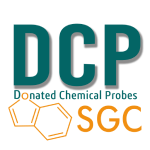ABT-100
Inhibitor of FNTB
Structure
In Cells
In Model Organisms
Probe ABT-100 is in the process of SERP review.
Please continue to check back for new reviews and commentary.
SERP ratings and comments
SERP Ratings
SERP Comments:
ABT-100 has been investigated as a novel farnesyltransferase inhibitor in vitro and in vivo. ABT-100 is a highly potent (IC50 = 0.05 nmol/L) inhibitor of the farnesyltransferase and displays >100,000-fold selectivity relative to geranylgeranyltransferase I.
(last updated: 4 Jun 2020 )
SERP Ratings
SERP Comments:
ABT-100 appears to be a potent and selective probe compound for the investigation of FNTB biology. Selectivity against the closest related target appears good, though there are little data in the peer-reviewed literature to describe off-target selectivity claims or the SAR relationships. The presence of an inactive tool compound (ABT-108) for use as control is claimed though again, the identity or properties of this claimed derivative are not clearly reported in the literature for verification. However, independent validation is available for these factors via the SGC at https://www.sgc-ffm.uni-frankfurt.de/#!specificprobeoverview/ABT-100. This additional data, alongside an accompanying data package from the originators at Abbvie, significantly enhances the probe’s value and helps support its recommendation as a credible tool molecule.
(last updated: 24 Nov 2020 )
Portal Comments
In a 2023 study, Hu et al. evaluated ABT-100 in live-cell assays for Phospholipidosis induction, cautioning about adverse effects at concentrations near 1 uM. (DOI: 10.1016/j.chembiol.2023.09.003)
(last updated: 7 Nov 2023)
